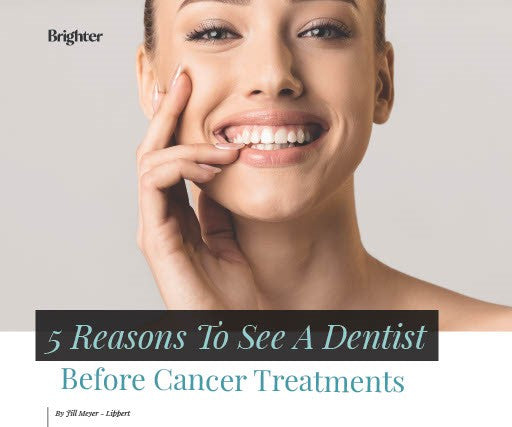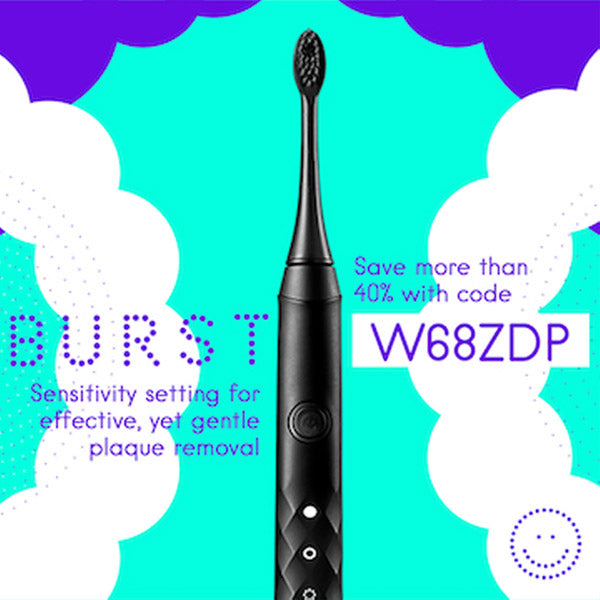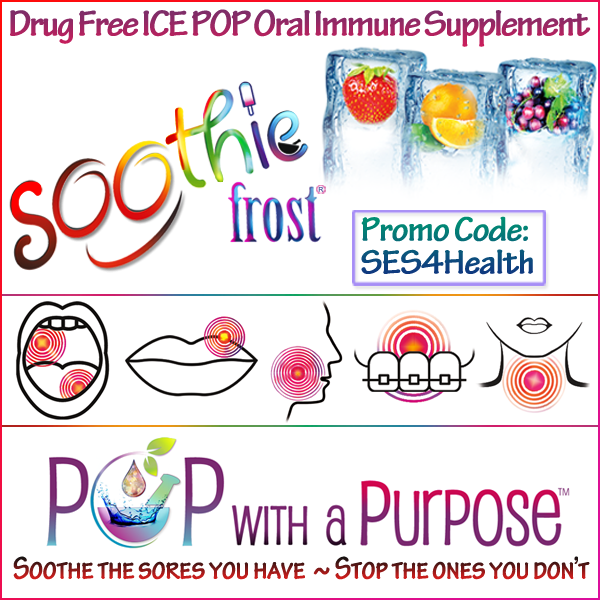5 Reasons to See a Dentist Before Cancer Treatments

It was a pleasure to collaborate with the awesome team at Brighter Magazine!
Brighter Magazine is the only glossy, full color lifestyle magazine targeted for women in any stage of their cancer journey. Their goal is to become the cancer survivors' companion, as they empower, and equip these women to be enthusiastic about their lives during these critical times.
Download the article, "5 Reasons To See A Dentist Before Cancer Treatments" HERE or by clicking on the image below:
You can subscribe to Brighter Magazine HERE

Full text of article is copied below:
Author: Jill Meyer-Lippert, RDH
Oncology and dentistry are often viewed as very separate and unrelated areas of healthcare but just as oral health has proven to impact a variety of other health issues, such as cardiovascular disease, diabetes, and Alzheimer's disease, problems in one’s mouth can significantly impact cancer treatments and survivorship.
Preventing oral health problems is far easier and more beneficial than repairing damage after it has occurred. Here are 5 ways that seeing a dentist in the window of time between a cancer diagnosis and starting treatments can not only improve one’s quality of life but also potentially help to achieve more successful treatment outcomes.
Many types of cancer treatments can cause problems in the mouth and once oral side effects start, they tend to reoccur and become more severe as the course of treatment moves forward. Your cancer team and your dental team can work together to anticipate what problems may occur during the treatment process and develop a prevention plan. While not all medical or dental professionals have training in the specialized area known as dental oncology, online resources are available for guidance.
It is important to take an active role in your care. This requires being aware of what mouth problems may occur and understanding what can be done to reduce these risks. Using the proper oral care tools, techniques, and products each day can make a world of difference! Make sure these recommendations are coming from a trusted source as advertisements and social media commentary may be misleading or provide incomplete information. Avoid masking one issue to only cause a different problem.
Dental problems, such as cavities, broken teeth, gum disease, and poor oral hygiene can accentuate the risks of side effects and treatment complications. Removing and/or repairing damaged teeth or areas that may cause tissue irritation provides better comfort and the ability to chew effectively for proper nutrition needed to maintain weight and strength.
Cancer therapies often also affect blood cells. When the number of white blood counts decreases, it becomes more difficult for the body to fight infection. If there is an infection present inside of the mouth, it can potentially spread throughout the body. Low platelet levels make the blood less likely to clot efficiently. In those cases, bleeding gums can become a very serious and urgent complication. Proactive oral care will reduce the risks of mouth problems causing alterations or delays in treatments.
Accurate oral health records can not only help to determine immediate needs but also provide a baseline to enable the dental provider to gauge the level of changes that occur in the mouth during the treatment process. This will show the effectiveness of any procedures or preventive strategies that are implemented to determine if alterations are necessary to achieve the best results moving forward. Baseline records can also potentially aid in future coverage by insurance and other benefit programs by documenting what conditions were present or absent prior to treatments.
Some oral side effects may stop as soon as treatments are complete while others may take more time to resolve or never fully go away. Establishing a schedule of follow-up appointments with your dental team after treatments are done will help to catch problems early to reduce the complexity of the solutions and prevent new problems from occurring. It’s important that dental check-ups also include a yearly thorough screening for oral cancers. Always report new or worsening symptoms to your oral health provider.
Making a commitment to continuous personal and professional oral care routines throughout your lifetime will provide greater protection against the physical, emotional, and financial stresses that dental disease can cause and help to keep you smiling!
Resources:
1 https://www.heart.org/en/news/2018/11/07/bad-tooth-brushing-habits-tied-to-higher-heart-risk
2 https://www.cdc.gov/diabetes/managing/diabetes-oral-health.html
3 https://www.nia.nih.gov/news/large-study-links-gum-disease-dementia
4 https://www.dentalhealth.org/preventive-care-and-oral-hygiene
5 https://sideeffectsupport.com/
6 https://mascc.org/resources/mascc-guidelines/?refer=oral-care-study-group
7 http://isoo.world/patient-education.html#sheets





